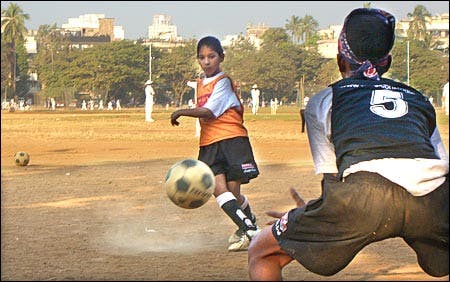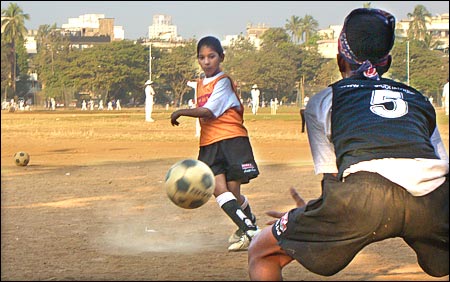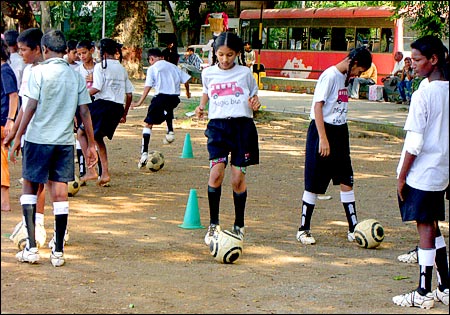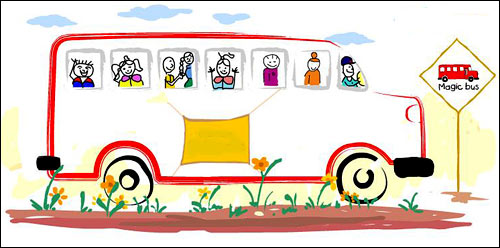Get on the Magic Bus: Girls Dare to Dream Big
Apr 28, 2022
First story




Get on the Magic Bus: Girls Dare to Dream Big
<
p>By Rashmi Bansal
<
p>MUMBAI, India - Twelve-year-old Pinky Gupta whizzes past defenders during an all-girl soccer match in Mumbai, India, launching the ball toward her opponents' goal. Her face flush with excitement, she radiates a zest for tapping her power, especially since this new-found resolve extends beyond the soccer pitch, helping her burst the limitations imposed on her as a girl growing up in Mumbai's slums.
<
p>Through Magic Bus, a Mumbai-based Sport For Development organization, Pinky is getting a taste of her own power and catching a glimpse of a future of freedom and hope. Without such an experience, Pinky likely would lead a narrow life as a laborer, perhaps fetching water, cooking, and caring for another family's children.
<
p>Now, her sights are set on a profession, she says."I want my brothers and sisters to get an education. I too want to work in an office.”
<
p>Pinky was expected to make herself useful from an early age peeling potatoes and cutting onions for her father, a vendor of
<
p>bhelpuri (a popular street snack in Mumbai). When first approached by Magic Bus, most parents in her community would say the kitchen is the place for a girl. Why on earth would she want to get onto a soccer field?
<
p>They allowed her to participate in Magic Bus since it took only two afternoon hours per week after her chores were finished. They soon found the lessons of the game are not confined to the playing field.
<
p>Through Magic Bus, Pinky and her parents are discovering that sport doesn't need to be a luxury that competes with their day-to-day survival activities. Children who participate in Magic Bus are empowered to dare to dream of dramatically improving their lives, and to achieve their dreams.
<
p>"Sport is about giving these girls the space and freedom to be children," said Alka Shesha, founding partner and chief operating officer of Magic Bus.
<
p>Matthew Spacie founded Magic Bus in 1999 while working for an established travel company in Mumbai. He convinced fellow rugby players at the Bombay Gymkhana to help him coach street children he spotted playing outside the club, and to take them on outdoor camping trips. "My original idea was to allow kids an outlet for fun and recreation," he recalls. "But playing sports impacted their self esteem dramatically as well."
<
p>Seeing the power of combining sports with social development, Spacie quit his job in 2001 to launch Magic Bus. Now the Magic Bus program is becoming more focused and methodical with different modules designed for children ages 7-9, 10-14, and 15-18.
<
p>Since August, Magic Bus has been piloting a program to expand throughout India and Asia, beginning with three Indian states, where it is franchising its programs through a “train-the-trainer" academy that empowers young people to deliver their own self-sustaining, sport for development programs within their communities.
<
p>Like Pinky, Yasmeen Sheikh credits sports sessions at Magic Bus with lighting up her otherwise "dark life." It was tough for Yasmeen to convince her parents to allow her to play at all. On the field, the girls wear t-shirts and long shorts and socks that cover most of their legs.
<
p>"They wanted me to play only in salwar kameez (traditional clothes consisting of loose pajama-like trousers gathered at the waist by a drawstring or belt and a long sleeved tunic), not shorts and t-shirt," she grins. And they were very concerned that she would "interact with boys" on the field.
<
p>But eventually they relented. Today, they are pleased to see Yasmeen's new-found confidence and enthusiasm for life. She dreams of playing soccer at the competitive level someday, just like the older boys' team.
<
p>Magic Bus sends its mentors door-to-door to persuade reluctant parents to allow their girls to join the program. They organize weekly sessions for the girls, beginning with two months of rapport-building to draw out the girls’ opinions and issues, since they tend to be extremely shy. A wide range of problems are tackled during these sessions such as tensions between girls belonging to different religious and ethnic communities, or lack of team spirit.
<
p>Magic Bus boys and girls play soccer together because it is a less familiar game in India, which makes it unbiased, Shesha explained. "The boys have never played it, so they have no advantage over the girls. We make them both play together as equals."
<
p>The children learn important life lessons by playing together. The boys learn they must listen when a girl speaks—a real step forward in a community where it is common to see alcoholic husbands beating their wives.
<
p>One of those girls, 12-year-old Reema (name has been changed to protect identity), came from a family so poor that they often went to a temples to find an evening meal. When she joined Magic Bus, she "never opened her mouth," youth mentor Raskar recalls. "Slowly, we built her confidence. Then we gave her responsibility—she was made captain of the team. Now she is completely changed."
<
p>Today Reema goes to school regularly and is in better health. Most important, she is carefree and sees a hopeful future for herself. The way these girls are treated by their communities is beginning to change, as the importance of schooling and not marrying young is now more accepted.
<
p>"These girls are aware now, they are empowered," Shesha said." They will stand up for themselves and make informed choices in their lives."
<
p>
Be Involved
Donate online.
Donate needed sports equipment and other items.
Explore opportunities to volunteer or work with Magic Bus by emailing
Fast Facts
Magic Bus serves 3,500 children each year with more than 130 employees and about 240 volunteers.
Magic Bus works with children and their communities in some of the poorest sections of urban society, such as Mumbai's Dharavi area (Asia's largest slum) and among the workers of Bombay Port Trust.
Magic Bus employs some of the young people in its program as "peer leaders." They serve as role models for younger children.
Convincing parents to let girls take up sport is a challenge, but so many benefits eventually become clearly visible that the community begins to actively support it.
Magic Bus supports Ashoka’s Youth Venture program in India with games and fun activities that help young people learn to create and manage successful social ventures.
Learn more at www.magicbusindia.org




